Events January 2017
NEWSLETTER
MCAA/EUROSCIENTIST 2017 WEBINAR SERIES ‘WHAT CAN SCHOLARS DO ABOUT THE REFUGEE CRISIS?’
For the first edition of our 2017 webinar series, there will be a round table on how scholars can help alleviate the refugee crisis. Speakers include:
- Rose Anderson (Acting Director for Protection Services, Scholars at Risk);
- Dr Enno Aufderheide (Secretary General of the Alexander von Humboldt Foundation);
- Dr Allan E. Goodman (President and CEO, Institute of International Education);
- Dr Renata Suter (Head of Research, Kiron).
The round table will be moderated by Dr Michele Catanzaro (Editorial Board, Euroscientist).
The event will be held online on 15 February 2017 at 17:00 CET.
Please register here now to reserve your place!

MICAELA CRESPO QUESADA
NEXT GENERAL ASSEMBLY IN SALAMANCA: WHAT WILL HAPPEN?
Event restricted to the members of the MCAA Board
Event restricted to MCAA Members
Morning:
Opening Speeches
- Brian Cahill, Chair of the MCAA Board
- Odissefs Panopoulos, Policy Officer DG EAC.C3 - European Commission
Approval of the minutes of the General Assembly 2016
- Maria-Antonietta Buccheri, Secretary of the Board of the MCAA
Report on 2016 Activities and Approval of Annual Accounts 2016
- Maria-Antonietta Buccheri, Secretary of the Board of the MCAA
- Kiran Kumar Chereddy, Treasurer of the Board of the MCAA
Appointment of the Chairs of Working Groups and Chapters
- Marco Masia, Vice-chair of the Board of the MCAA
Enhancing Collaboration Among Members Part I
- Parallel sessions for six Working Groups to present their work to a smaller audience: Communications; Career Development; Gender Equality; Bridging Science and Business; Events and Networking; Science Policy
Afternoon:
Poster Session
Promoting Engagement of Membership within MCAA
- How to Contribute to the MCAA
- Suggestions to MCAA board and open floor for Q&A
Morning:
Event open to all registered participants
Opening Speeches
- Brian Cahill, Chair of the MCAA Board
- Juan Manuel Corchado, Vice-Rector for Research, Salamanca University
Plenary Session: Protecting Freedom in Science
- Role of scientists and researchers in society
Sophie Beernaerts, European Commission Head of Unit DG EAC - B3: Innovation in Education, EIT and MSCA - Logic and Reason: Their roles in Contemporary Society Mats Rosengren, Professor of Rhetoric, University of Uppsala
Session A: panel discussion: science to business: researcher to employer
- Emilio Corchado – Salamanca University – Organiser Start-up Ole
Session B: Pensions for Mobile Researchers
-
Dr Paul Jankowitsch, RESAVER Pension Fund
-
Delicia Hofmann, Claudia Wegner-Wahnschaffe Findyourpension.eu Project
Afternoon:
Panel discussion: International Cooperation and Mobility of Scientists
-
Gülsün Saglamer, Former Rector of Istanbul Technical University
-
Margaux Kersschot, Adoc Talent Management, former president of Eurodoc
-
Fiona Colligan or Martina Mallett, jobs.ac.uk
-
Izaskun Lacunza, Spanish Foundation for Science and Technology (FECYT)
Parallel Sessions: Skill portal
Session A: Business communication skills: pitching with song, music and dance
- Kiran Kumar Chereddy, Treasurer of the Board of the MCAA
- Rita Ribeiro (BeNeLux chair)
-
Scott Harrison, Eduworks ITN
Session B: Mentoring and Networking
- Francesco Grassi / Danilo Maddalo - MCAA Academy – MCAA’s mentoring scheme
- Frauke Kersten / Natalia Balcazar – Practical example of how Mentoring helps career development. How can MCAA help displaced researchers?
- Sinead O’Gorman – European Director of Scholars at Risk
MCAA Awards Ceremony
- Brian Cahill, Chair of the MCAA
- Marco Masia, Vice-Chair of the MCAA
- Amit Zodge, Vice-Chair of the MCAA
The updated version of the programme is available here.
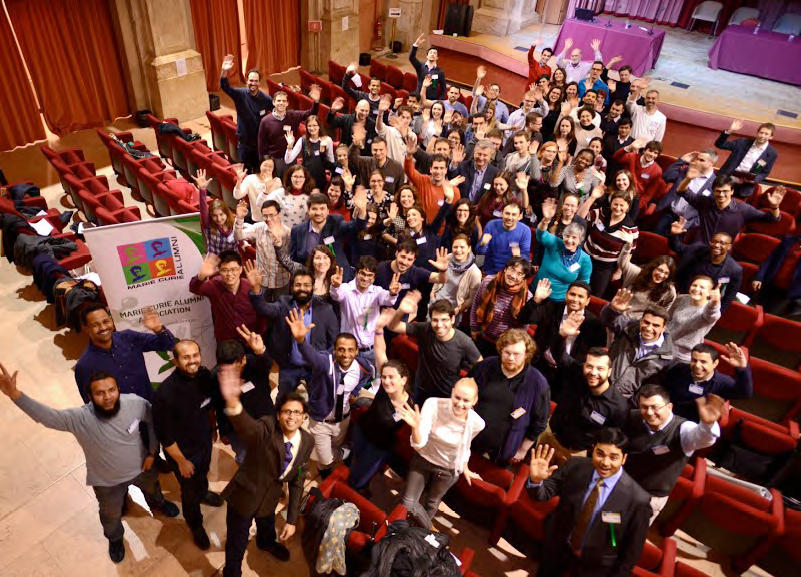
Nota Bene: the following agendas are working drafts, based on information available at the time of publication. The final details will certainly evolve further over the time between now and the events.
REPORT ON GENDER SUMMIT EUROPE GS9
Brussels, 8-9 November 2016, European Parliament and BEL Brussels
Gianna Avellis and Natalia Balcazar attended the Gender Summit Europe GS9 from 8 to 9 November in Brussels and presented a poster. To share the experience with you, they have prepared a round-up of all the main events and connections made.
The Gender Summit Europe GS9 was took place in two locations: the European Parliament and the BEL Brussels building.
The focus of discussions at the Parliament was the role of policy in achieving societal well-being through science and technology, specifically tackling gender inequalities in health: this is an area where there is scientific evidence that gender differences influence how many diseases occur and how they affect women and men, including mental health and illness.
Commissioner Carlos Moedas
appeared via video presenting the “She Figures” report. He discussed why more women are choosing a career in science and what we can do to avoid a ‘leaky pipeline’.
The sessions at the Parliament was opened by South Africa’s Minister of Science and Technology, who spoke of “the importance of Involving Women in S&T for the development of nations”. She underlined how women should be included as equal actors, and that it is important to recognise that their needs may differ from those of men.
Several policy initiatives around the world were set with the expectation that science will provide the knowledge needed to make the world a better place for all. Such initiatives include HORIZON 2020, the UN Sustainable Development Goals agenda, the OECD’s Inclusive Innovation project, the Millennium Technology Prize and collaborations for global health.
Elizabeth Pollitzer, co-founder f the Gender Summit (GS), underlined how it has evolved into a global platform where scientific evidence and good practice are shared with the aim of reaching consensus on when and how gender issues impact on the quality of science knowledge, practice and institutions.
Gianna Avellis and Natalia Balcazar presented a poster on “Closing the Leadership Gender Gap in Research, Industry and Business”. The poster and the abstract reported the results of a workshop at the University of Bari in May 2016 on promoting female leadership through role models across research industry and business.
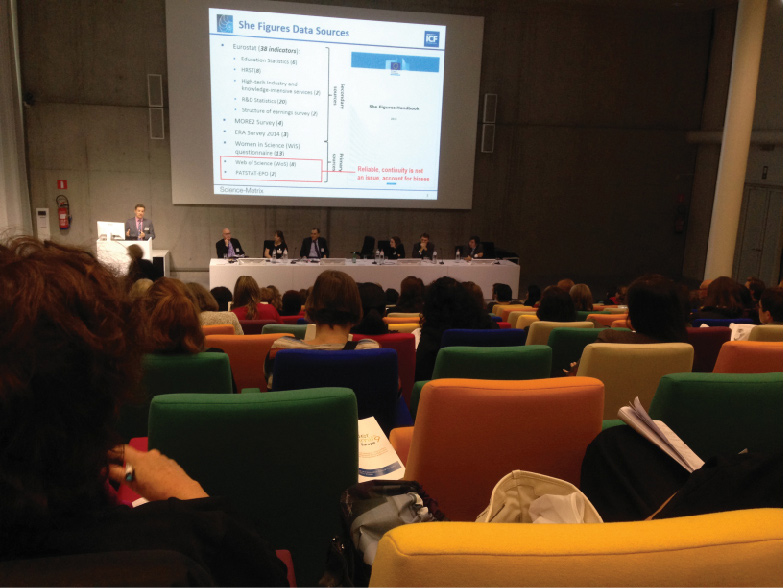
Attendance at the Gender Summit led to fruitful contacts, namely with Elena Gentile, Member of the European Parliament from Bari, who promised her patronage for the Bari EUWIIN2017 conference
and award.
- Dr Lotta Strandberg, senior adviser at NordForsk, was approached regarding EUWIIN2017 and the HUMBOLDT project.
- Prof. Uduak Archibong from the GENOVATE project and her colleague Prof. Crina Oltean-Dumbrava (Chair in Sustainable Built Environment School of Engineering) from University of Bradford were both contacted regarding EUWIIN2017.
- Dr Elizabeth Pollitzer, Gender Summit organiser, was approached regarding the promotion of EUWIIN2017 and the HUMBOLDT project. She could be a good speaker at EUWIIN2017 on the theme of gendered innovation.
- Prof. Marja Makarov, Director of the Biocenter Finland and member of Gender in the Nordic Research and Innovation Area Programme Committee, NordForsk, was also approached as a possible speaker at EUWIIN2017.
The main EU-funded projects advancing gender equality through structural changes were approached, and in particular those working on gender equality plans.
These include:
- GEAR (Dimitros Tsoutsias);
- GENOVATE;
- COST ACTION The String Theory Universe (Prof. Maria Antonia Liedo Barrena);\
- PLOTINA (Prof. Tullia Galina Toschi, from University of Bologna);
- GENERA.
Gianna Avellis also contacted Dr Hans M. Borchrevink, former director of ‘Medicine’ and special Adviser for International Affairs Staff at the RCN (Research Council of Norway).
G. AVELLIS,
N. BAlCAZAR
BRIDGING SOCIAL AND GEOGRAPHICAL SPACE THROUGH NETWORKS
Workshop, Topoi Excellence Cluster, Freie Universität Berlin, 2-3 December 2016
Helen Dawson was behind this workshop, which took place in Berlin, on 2-3 December 2016. She tells us about the experience, and explains why networks have become a priority for social scientists.
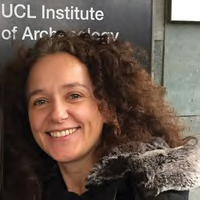
Human society is constantly changing; different forms of interaction lie at the heart of this process. Networks of all kinds (social, cultural, religious, economic, political, etc)
underpin human society and we must therefore grapple with networks if we are to understand the changes our society is undergoing. Unsurprisingly, studying networks has become a priority for social scientists, economists, politicians, and philosophers alike. We generally think of archaeologists as being primarily concerned with studying the past, but the fact is, archaeology provides a bridge between past and present.
Global interaction is a modern phenomenon but – on a different scale – it has historic parallels. Networks are an obvious way of thinking about social relations in the present, but how did social interaction work in the past and what can this tell us about how current networks have developed? Thinking through networks makes us reconsider how we have conceived societal change so far, to the point that we may be living through another “cognitive revolution”.
Interdisciplinary research has the greatest potential for producing results that are both relevant for understanding the past and providing feedback on how society has developed. To pull this together, archaeology must ally itself with other social sciences. The recent workshop on ‘Bridging social and geographical space through networks’ is an example of this interdisciplinary potential. The principal aim of the workshop was to explore different conceptualisations of space (both geographical and social) through the use of networks. Speakers referred to networks both as a metaphor for human activity and as a rigorous methodology, the latter including the application of Social Network Analysis and the use of geographic networks (e.g. Geographical Information Systems, or GIS-based approaches).
The range of speakers at the Berlin workshop is evidence of the broad range of directions this kind of research can take, with case studies ranging from the Andes to New Guinea, from Iberia to the Near East, and dealing with different time periods and societies(for details see here). Networks can help overcome perceived boundaries between traditional anthropological and archaeological categories, with – for example – patterns in material culture likely reflecting interaction patterns rather than linguistic boundaries. Speakers employed network analysis to address social aspects of spatial patterning on the supra-regional, regional and local level. Case studies dealt with the evolution of networks of transportation and communication, and their impact on society across time: such recursive relation can help explain important historical processes, such as the rise of Rome.
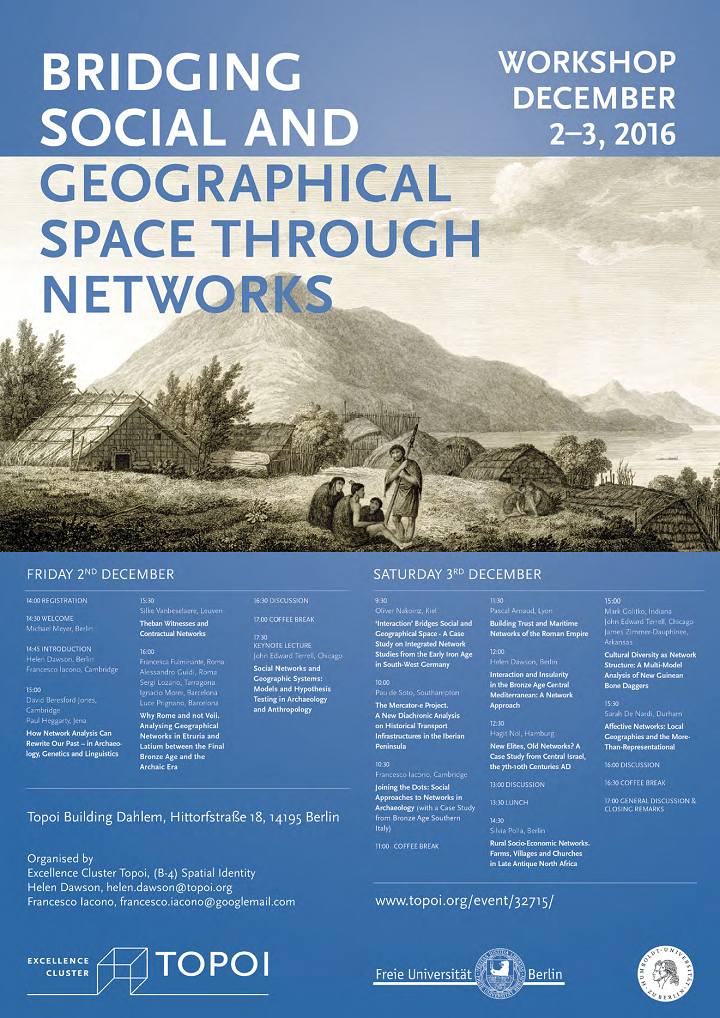
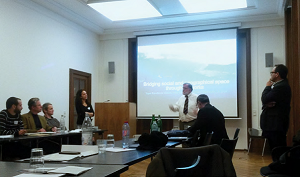
Spatial data patterning provides clues on long-range relationships between communities as well as the emergence of elites and social differentiation.
Small islands illustrate the power of networks in defining concepts of centrality and marginality in prehistory as much as in the present. Papers focusing specifically on social themes dealt with networks of trust, which enabled transactions in the Roman world, and the role of witnesses in ancient contracts. Applications of network analysis can also benefit from the use of social theory. Life experiences, people, places and things are all tied up in affective networks: memory and identity are compelling forces which can also shape networks.
Humans are inherently social and have a tendency to interact, our job is to understand the mechanisms underlying this process and its effects. The workshop participants felt that this is becoming all the more pressing in light of the current resurgence of nationalist movements: as communities create networks they are able to overcome divisions and borders. Lessons can be learnt, as history repeats itself.
HELEN DAWSON
RESEARCH FELLOW IN ARCHAEOLOGY TOPOI EXCELLENCE CLUSTER FREIE UNIVERSITÄT, BERLIN